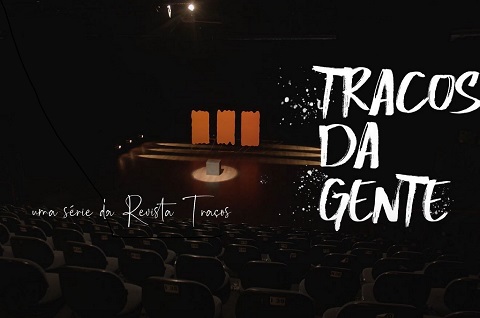By Maria Dahmén, Faktum
Last year, Swedish street paper Faktum wrote about two of its Malmö-based vendors, Birgitta and Vincent, who had decided that they would have a Las Vegas wedding. It was a portrait of two people, together for 37 years, who love each other deeply. They spoke about their relationship, their work as vendors and their excitement about their imminent nuptials.
***
It is Sunday 13 January 1980 and the temperature outside is barely above freezing. 23-year-old waitress Birgitta looks at the time and starts to clean the tables. The neighbourhood surrounding Möllan in Malmö is dark and closing time is approaching. The door opens and a man who was there with three others the night before enters – he is alone this time. He orders a beer and a shot.
Soon after, he asks Birgitta if she wants to join him and to go out for a drink. Half an hour, later they leave the restaurant and go across town to the Centralen pub, where she is offered a glass of French liqueur by her 30-year-old companion. His name is Vincent.
Thirty-seven years later, the couple is sitting comfortably on a sofa in the top floor of an apartment building in south-east Malmö. “He never finished his beer,” says Birgitta, as she fetches a paper towel to mop up some spilled coffee. “You need to take the lid off the thermos, Vincent!”
Vincent didn’t have much to do on that night so many years ago. He had recently separated from the mother of his little son and was living with another woman. But when Birgitta came into the picture things happened fast. Within a week, she had made room for him in her small flat on Simrishamnsgatan.
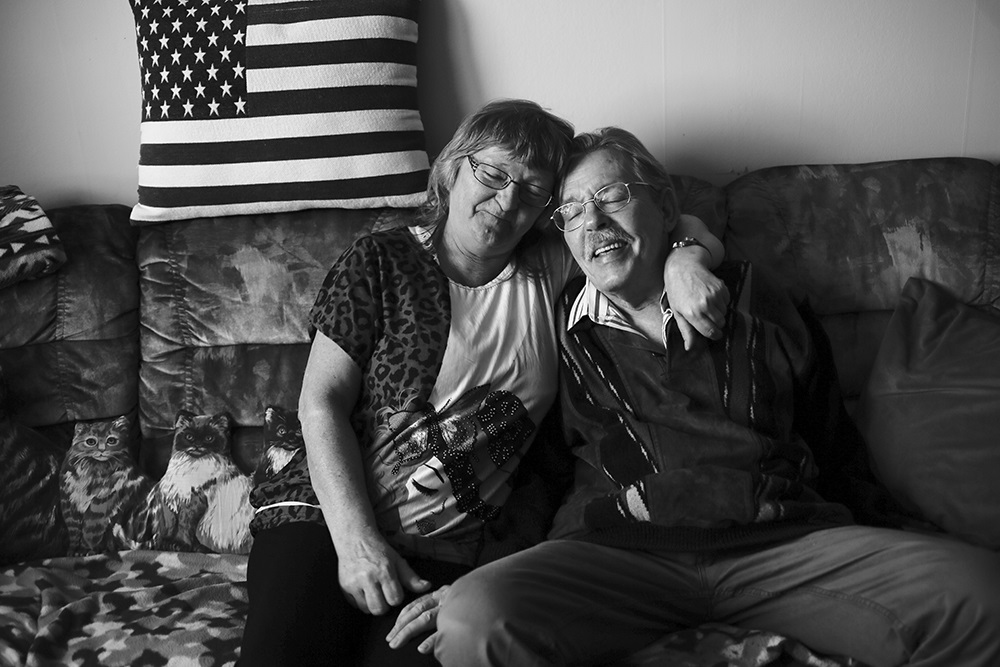
Those who meet the couple can quickly observe a pattern. Vincent is talkative and always manages to fire off four or five sentences before his counterpart can get a word in. Birgitta is the exact opposite. She will squeeze in her own comments here and there, sometimes at a slightly higher pitch than normal.
Their living room is cosy and lived in. Above the sofa hangs a painting of a sailing ship on a stormy night and next to it is a painting of a well-known sailor puffing on his pipe. In between the two, the Mona-Lisa smiles from inside the boundaries of a beautiful frame. Birgitta locks her eyes on the ship. “I like this one a lot,” she says. “There’s such a nice light in it. Isn’t there?”
Birgitta is approaching 60, but she is still fairly girlish. As a little girl, she often played in her grandmother’s house in Limhamn outside Malmö – a place she still loves. “People from that place are special. The old ones, I mean,” she says, and looks in Vincent’s direction across the table. Her family is working class. Her grandmother, mother and many other family members worked at Mazetti, the large chocolate factory on Bergsgatan. The workers often biked home from the factory with free candy to share with eager children and grandchildren.
“But Vincent was born with a silver spoon in his mouth,” Birgitta says. This is true. Vincent’s father was a contractor and built the teacher’s college, the subterranean toilets on Stortorget, as well as the fountain on the same market square. His mother was a homemaker. Vincent was expelled from a number of schools and acknowledges that he was “quite naughty”. “Well! Take, for instance, the great gold robbery in Malmö when I was twelve,” Vincent starts, before Birgitta interrupts him. “In the name of Jesus, talk about something else!” she laughs.
Vincent did, in fact, lead a criminal life, but he gave it up 25 years ago. He could, he admits, have spent the afternoon with drug dealers and met governors for dinner back then. “And I knew how to behave perfectly at home,” Vincent tells me. “As a teenager I was dressed in clothes from Martys klädbutik [an upmarket and exclusive clothing store]. In my wardrobe, I had three formal suits.”
Vincent has always worked, in his own way. His CV is pleasingly random: he “accidentally” started a photo company, “happened” to run a radio store, “happened” to buy Ellstorps kiosk and also ran a disco in Kävlinge Folkets park. “The first night Kal P Dal played and then it went well,” Vincent says, as he thinks back to his days of running the disco. “Another time I picked up a disc jockey from Radio Luxemburg. I have always tried a little bit of everything and have experienced a thousand different things,” he says. Those who know him know that what he says is true.
The wall across the room from the sofa is covered by a bookshelf that resembles a shop shelf. One section is filled with statues of angels in all shapes and sizes and another with cats. On top of the shelf is a skull, which was purchased in Copenhagen for Halloween. On a table is a small plastic Christmas tree with all the lights switched on. Neither Vincent nor Birgitta seem to want to take it down. Besides, it is connected to the rest of the electronics in the room.
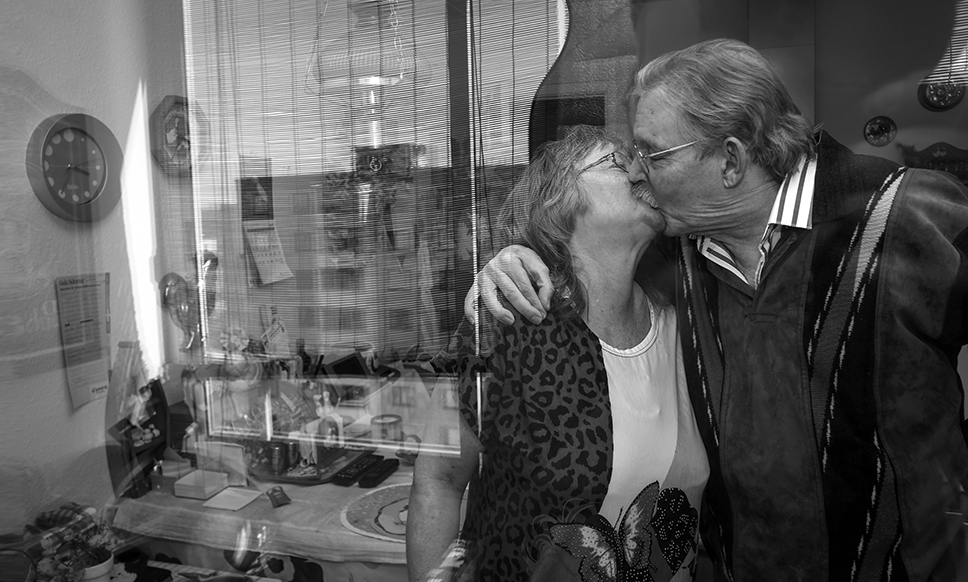
Vincent loves to fix things, he tells me, before he offers to make sandwiches. He returns fifteen minutes later with open sandwiches of liver paté, garnished with yellow and red peppers, chopped onions, dill, salt and pepper. “He always puts so much stuff on,” Birgitta giggles. “She puts on butter, cheese. Ready! The first ten years that we were together, she could only make canned meatballs and fish sticks,” says Vincent, before he starts muttering about how Birgitta always starts putting away ingredients and condiments before he is finished.
On clear days, you can see the famous Öresund bridge from the couple’s balcony beside the kitchen. Once, Birgitta and Vincent had a view of the fields on Söderslätt from their rented house in the town of Katslösa. They have also lived in a trailer in an industrial park in Svågertorp and lived in a villa on large grounds with fruit trees in Birgitta’s beloved Limhamn.
It was after their years living in the villa in Limhamn that life took another unexpected turn.
In 1982, while looking for the TV-guide in the paper, Vincent spotted an advertisement for a house for rent in Torrevieja, Spain. The house was available and, a few weeks later, they were driving south. Their destination was 40 kilometres outside Alicante, which is a region that they called home off and on until 2006. With only 7,000 kroner [approximately £700] to start their new life, money didn’t last long. How did they raise money? The couple improvised and took all the small jobs they were offered. “We cared for gardens when the homeowners were away. And we started renting out flats and making sure that they were cleaned before the next tenant arrived,” says Vincent. “We made so much money back then. Jesus!” exclaims Birgitta, before putting a pillow behind her neck. Birgitta and Vincent lived at a variety of addresses during this time and, outside their apartment in Almuñecar, the ocean stretched out all the way to Africa. “I even drove an illegal taxicab,” says Vincent. Birgitta quickly cuts in and tells him that he can’t say that in a paper. “But it has been so long,” he protests, “and for the last eight years I’ve worked with computers.”
Vincent argues, as often as he can, that Spain has more upsides that their home country of Sweden. According to him, everything feels easier there and the sun shines more often. In Sweden, Birgitta struggled with a chronic illness, but down by the Mediterranean her health became much better. Her future husband did not have the same luck. On the day before Christmas, one year after their arrival in Torrevieja, Vincent suffered four strokes in four days. “I was in a coma for a week. And when I woke up I couldn’t stand on my own two feet,” he recalls. “Back then, I smoked so Birgitta had to help me to the smoker’s lounge.”
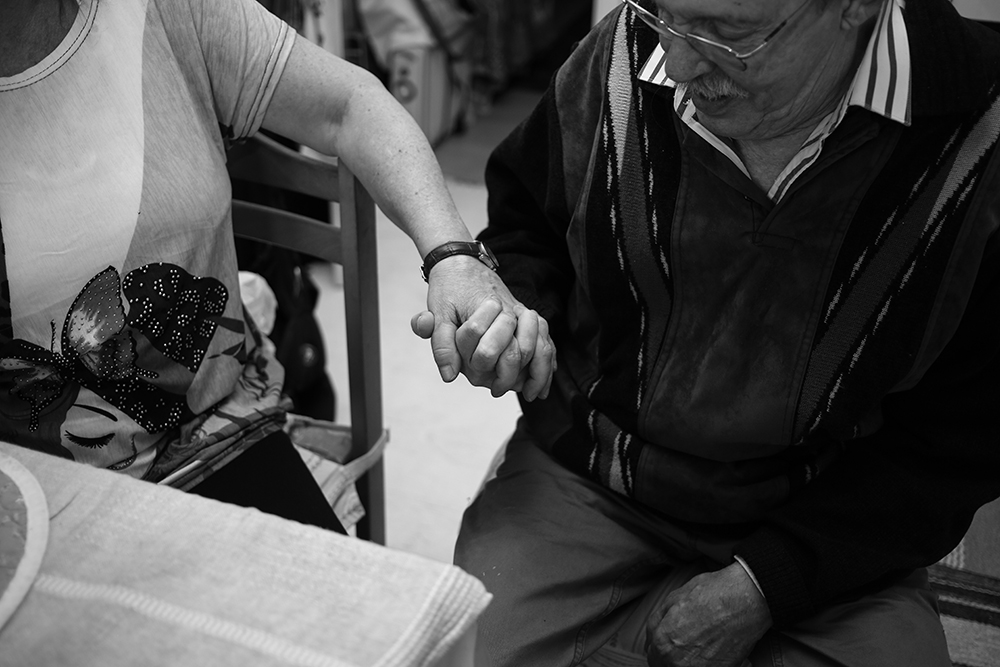
Vincent is annoyed that his memory isn’t as good as it was before the strokes. Birgitta looks at him tenderly and says that he had a photographic memory when they met. “Yes, when I sold properties in Spain and twenty potential buyers contacted me I could easily remember who wanted to live by the sea, in the mountains or in the city centre,” he says. “After the stroke, I talked to maybe three people and could still not remember anything after.” Birgitta explains that it took years for him to retrain his memory. During this time, she kept busy, partially with her own gigs – like translation for instance. “I worked with Swedes who needed help with the language when they went to the police or any other authorities,” she says.
The couple has no difficulty in showing their love for each other. They don’t need to be encouraged to kiss for a picture and they lean in to kiss each other on the lips. They are a seemingly happy couple, although they have their own worries, just like everyone else. They have also known sorrow, too. When Vincent moved to Spain, his son Joakim, from a previous relationship, was two years old and lived mainly with his mum. But as a teenager, he spent more time with his dad and Birgitta. She remembers that he could call her up to ask for a recipe. Then Joakim started doing drugs. “I discovered it when I took a quick trip home to Malmö,” Vincent recalls, “and I could see in his face that something wasn’t right.”
When Joakim was 16, he travelled down to visit his dad in Spain. The family spent eight months in the sun: sailing, swimming and windsurfing. The teenager loved to sail around in a rubber boat. Whatever the vessel, Birgitta was always their captain, as she had a boating certificate. The three of them were together around the clock and, according to dad Vincent, his son did not get the chance to do drugs.
“He got to experience so much,” says Vincent. “And then he was offered a job here, at a disco. That’s why he went home to Sweden, to deal with the practical stuff.” After his son left Spain, everything went quiet. It stayed that way for weeks. Then a letter arrived from one of Vincent’s cousins. “It said he had died of an over dose and that the funeral had already taken place,” Vincent says. Birgitta’s eyes tear up. “It was hard,” she says. “You don’t give someone word like that.”
The couple believe that Joakim started out smoking weed before he transitioned to heroin. Birgitta suspects that, after going home to Sweden, he met a few friends in Lund and rekindled his drug habit. “‘You are my mum too’, he said to me once,” she recalls fondly. “We always talked to him like he was an adult.”
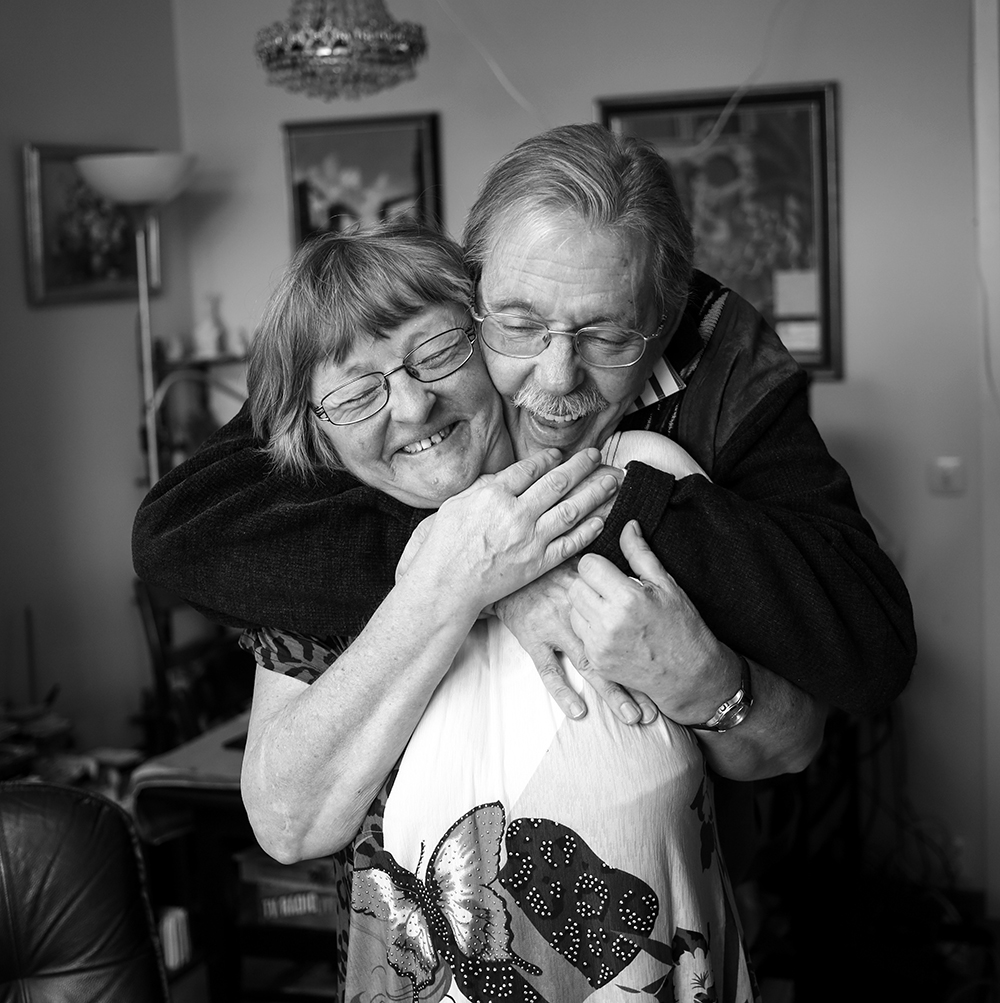
In 2006, the couple returned to Malmö and started selling Faktum in a shopping centre just outside town. They usually drive their car there, because they have a lot of luggage. Driving into the parking lot, Vincent pulls the hand brake and exclaims: “Birgitta Nilsson Petersson. BNP. The registration plate on the Volvo over there! We have always played the ABC-game and now we can’t stop!” Birgitta starts unpacking the boot, and what at first looks like a plastic container turns out to be trolley bag. She fills it with the newest issue – the one anniversary issue – and adds flyers and CDs. Then she wheels it to the entrance of Systembolaget, Sweden’s government-owned alcohol store.
Vincent also eventually finds his regular pitch. First, he takes a wander around the shops and stops at a hot dog stand where he is given a free coffee in a takeaway mug. It is favour given in return for the laminated sign that he made for the shop owner on his computer at home. Now nobody will miss the fact that the kiosk accepts card payments. Vincent’s bad back sometimes forces him to pass on longer shifts but, during the hours he does spend standing in the spacious entrance to the shopping centre, he asks everyone to “Please buy the paper of the homeless!” Birgitta calls out the same sentence. To curious customers who want to know more, Birgitta explains that some Faktum vendors are completely homeless, while others rent a bedsit. Many others, she says, want to get away from the loneliness and others struggle to survive. Everyone’s situation varies a lot. Today, she is standing in front of a table set up by an interior design boutique. It looks attractive, and she makes sure that the arrangement of napkins and candlesticks aren’t blown away by the draft when the doors open.
The couple regularly drive over to Bredgatan, where the Faktum office is located. The drives there are usually quick, as Vincent likes to see himself as more of a fiery Spaniard than a slow Swede when he is behind the wheel. They normally go there to buy more papers. From time to time, the vendor’s union holds a meeting and both of them sit around the table, as they are seasoned members of the board. Vincent likes to discuss ideas about how the street paper may improve. He loves photography and his photos have been published, such as those that he took on an abandoned estate in Industrigatan and on vendor excursions to Copenhagen. Birgitta has been featured in the magazine, where she was photographed on a horse.
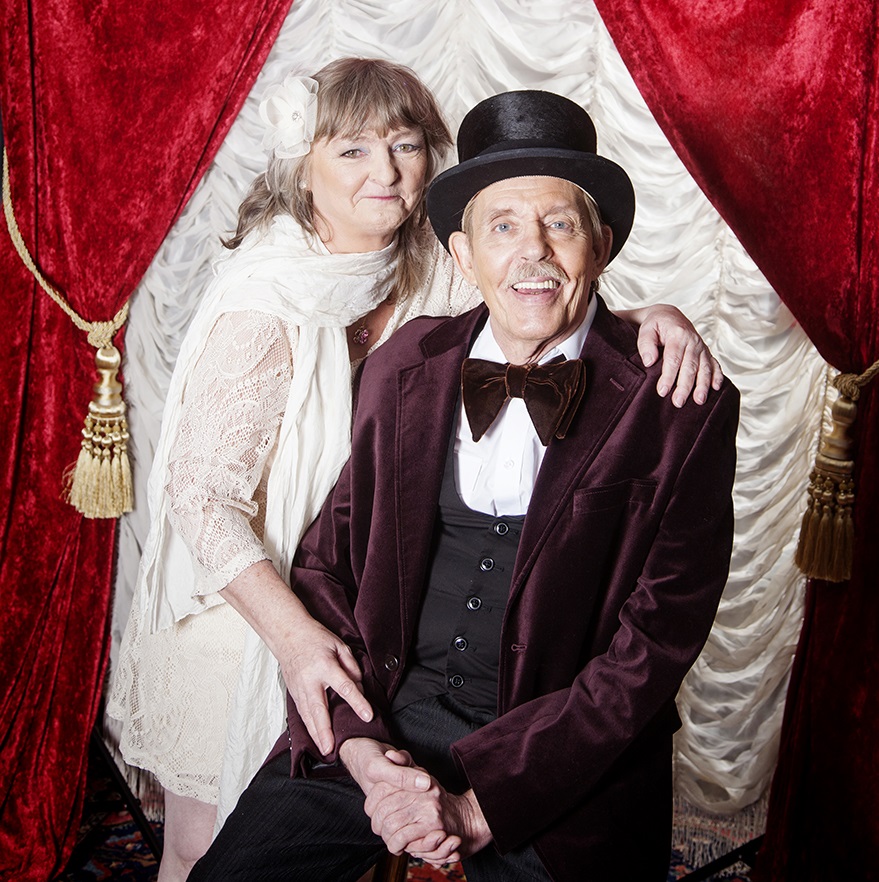
The couple also has plenty of experience with hosting auctions and flea markets, which is a hobby bordering on passion for both of them. Together, they have hired tables in public halls all around southern Sweden. They have filled a hanger with things and friends often help with the driving. Sometimes, they also place a small ad in a suitable local paper. “It’s always me that’s doing the selling,” says Birgitta. “Vincent runs off and buys stuff that we take with us to the next flea market.”
While they were living in Spain, the couple also had stalls at “mercadillos” [small markets], which differed a lot from the Swedish version. “The shoppers were more mixed and both new and second-hand goods were sold. Just like here we had to pay for our table,” Birgitta explains. “The difference between Kalmar and Alicante? That it rains in Kalmar!” She cheerily tells me about how she once drove a car down from Sweden to a Spanish flea market, put a price tag in its window and that an older gentleman bought the car for his fiancé.
“Ouch!” Vincent cries out. “This usually only happens three times a year, but now my neck has made a fuss twice in one day!” A cover photo is about to be taken in a decorated studio, but Vincent looks uncomfortable. Linus, the photographer, immediately helps him out. He massages out the pain and makes Vincent’s neck feel better. Birgitta is calm and collected as she prepares for a wedding photoshoot that has been organised to celebrate the couple’s upcoming wedding. Vincent, her future spouse, thinks that the makeup artist has used a powder that is too pale. “You look 90!” he says. Birgitta tries on several white dresses but, in the end, chooses a simple dress in lace from her own wardrobe. She feels somewhat more comfortable in this. “Vincent actually has great taste,” she smiles, after he suggests that her eyelids need a little bit of blue.
Their wedding is going to take place in the States, in the hot Nevada desert town of Las Vegas. The fact that this was Vincent’s idea is clear to most, but Birgitta seems just as happy with it. The couple have travelled a lot through the years. Before they ended up in Torrevieja on the Spanish mainland, the couple had vacationed on the island of Ibiza several times. The USA is also nothing new to them.
“We went to Florida together once. It was around Christmas, and it was decorated with lights everywhere. I love stuff like that!” says Birgitta, excitement in her voice as she recalls the memory. “The temperature was around 20 degrees, and we stayed by the beach anyway.” Vincent looks at his wife-to-be lovingly. They will book their trip to Las Vegas as soon as they have saved enough money and Vincent is looking forward to photographing the scenery from the window of the plane as they fly over the desert landscape. They are both looking forward to stepping out onto the tarmac after they arrive and to celebrating their wedding day 37 years after their first meeting.
“If it’s good enough for Elvis, we can do it too!” they laugh.
Translation from Swedish by Andrea Bærland




















